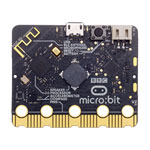The BBC micro:bit is a pocket-sized computer that introduces you to how software and hardware work together. It has many features that let it interact with you and your world.
The original BBC micro:bit has been a great success, helping to educate students in the joys of coding and embedded computing. Now there is a NEW BBC micro:bit with the same great features but now with speaker and microphone. The new computer adds even more opportunities for learning, exploration and creativity in the classroom.
This latest micro:bit will fit right in to your existing lessons and materials; all the existing MakeCode blocks and MicroPython code will work in the same way as they do on the original micro:bit. The previous micro:bit will also continue to work just as it did before.
With the built-in speaker, microphone and touch sensor on the new micro:bit, there are even more exciting things you can add to your projects:
Clap hearts - Clap your hands to make the heart beat using the sound sensor
Bumblebee - Fly your bumblebee to see how motion affects the frequency, tempo and volume of its sound
Hold the note - Keep singing to make all the LEDs light up
Mimic - Talk to your micro:bit and listen to it mimic the rhythm of your speech
Software development and compatibility
Online editors are designed to be really easy to use to program the micro:bit and this will continue for the new features of sound sensing, sound-making and touch.
The latest micro:bit will fit right in to your existing lessons and materials; all the existing MakeCode blocks and MicroPython code will work in the same way as they do on the original micro:bit. The previous micro:bit will also continue to work just as it did before.
- Built-in speaker, microphone and touch sensor
- Sense and react to sound
- Capacitive touch sensor (a bit like your phone!)
- Power saving mode
- More computing power
To use this facility please Sign In.
Sign In

